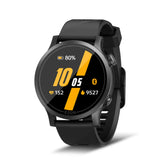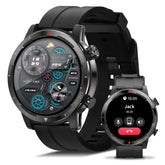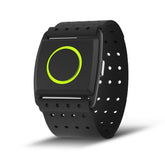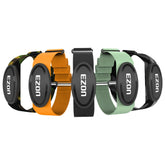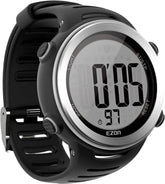Marathon Magic: Craft Your Own Marathon Training Plan for Success
Crossing a marathon finish line is a feat of endurance, discipline, and planning. Whether you’re a first-time marathoner or chasing a PR, a marathon training plan tailored to your goals and lifestyle is the key to success. This guide walks you through creating a personalized training roadmap, including nutrition tips, strategic rest days, and how a GPS running watch can elevate your preparation.
1. Start with Self-Assessment: Where Are You Now?
Key Questions to Answer:
- Fitness Level: How many miles do you run weekly? Can you comfortably run 10K?
- Goal Type: Is your aim to finish, improve time, or qualify for Boston (BQ)?
- Schedule: How many days/week can you commit to training (4–6 days is ideal for marathons)?
Sample Goal Setting:
- Beginner: Finish a marathon in 5 hours, focusing on consistency and injury prevention.
- Experienced: Run a sub-4-hour marathon by improving lactate threshold pace.
2. Build Your Weekly Training Structure
General Guidelines:
- 3–4 Key Workouts/Week: Long runs, tempo runs, and interval sessions.
- 1–2 Easy Runs: Focus on recovery and form (60–70% max heart rate).
- 1–2 Rest/Cross-Train Days: Yoga, cycling, or walking to reduce impact.
Sample 16-Week Plan Breakdown:
Weeks 1–4: Base Building
- Long Run: Gradually increase from 8 to 12 miles at easy pace.
- Strength Work: 2x/week core and glute exercises (planks, single-leg deadlifts).
Weeks 5–8: Intensity Training
- Tempo Runs: 20–30 minutes at marathon goal pace – 30 seconds/mile.
- Interval Sessions: 8x400m at 5K pace to boost leg speed.
Weeks 9–12: Peak Training
- Long Run: 18–20 miles, practicing race-day nutrition (e.g., gel every 45 minutes).
- Pace Simulation: 10-mile run at goal marathon pace to build confidence.
Weeks 13–16: Taper and Race Prep
- Reduce Mileage by 30%: Keep intensity high but cut volume to preserve freshness.
- Mock Race Day: Practice fueling, gear, and pacing in a final long run.
3. Nutrition Tips: Fuel for 26.2 Miles
A. Pre-Training Nutrition
- Carb Loading (3 Days Out): 6–10g/kg body weight daily (oats, sweet potatoes, quinoa) to maximize glycogen stores.
- Race Morning: 1–2g/kg carbs 2–3 hours pre-race (e.g., oatmeal with banana and honey).
B. In-Run Fueling
- Gels/Gus: 1 every 45–60 minutes (20–30g carbs each) – test flavors in training to avoid gut issues.
- Hydration: 300–600ml/hour with electrolytes (sodium 500–1,000mg/hour) to prevent cramps.
C. Post-Run Recovery
- 30-Minute Window: 1.5g/kg carbs + 0.3g/kg protein (e.g., chocolate milk + a rice cake).
- Meal Within 2 Hours: Lean protein (grilled chicken), complex carbs (brown rice), and veggies for sustained repair.
4. Rest Days: The Unsung Hero of Training
Why Rest Matters:
- Injury Prevention: Reduces risk of shin splints and IT band syndrome by allowing muscles to heal.
- Performance Boost: Rest days improve running economy and heart rate recovery.
How to Use Them:
- Active Recovery: Gentle yoga or walking to improve mobility without strain.
- Sleep Priority: 7–9 hours/night to support immune function and muscle growth – use a GPS running watch to track sleep quality.
5. Gear Up with a GPS Running Watch
- Precision Pacing: Multi-satellite navigation ensures accurate distance and pace, even in urban canyons.
- Workout Presets: Preload interval sessions and tempo runs, with vibration alerts to stay on target.
- Recovery Insights: Track resting heart rate and training load to avoid overtraining – critical for maintaining a balanced marathon training plan.
EZON GPS Series Features:
- 40+ hours of battery life for long runs without charging.
- Elevation data to prepare for hilly courses.
- Sync with Strava/TrainingPeaks for detailed performance analysis.
6. Common Pitfalls to Avoid
- Overtraining: Use a GPS running watch to monitor training stress score – a sudden spike signals the need for rest.
- Ignoring Weaknesses: Add 2x/week strength sessions for core and hips to support running form.
- Inconsistent Fueling: Practice nutrition in every long run to ensure your body adapts to race-day intake.
Your Marathon Journey Begins Now
Crafting a marathon training plan is about balance: pushing boundaries while honoring your body’s needs. By integrating personalized training, strategic nutrition tips, and a reliable GPS running watch, you’ll build the endurance, speed, and mental toughness to conquer 26.2 miles.
Remember, the marathon is as much a mental challenge as physical. Trust your plan, celebrate small wins (like nailing a 20-mile long run), and let your GPS watch be the tool that turns your marathon magic into reality. Lace up, stay consistent, and let every mile bring you closer to that finish line triumph.
